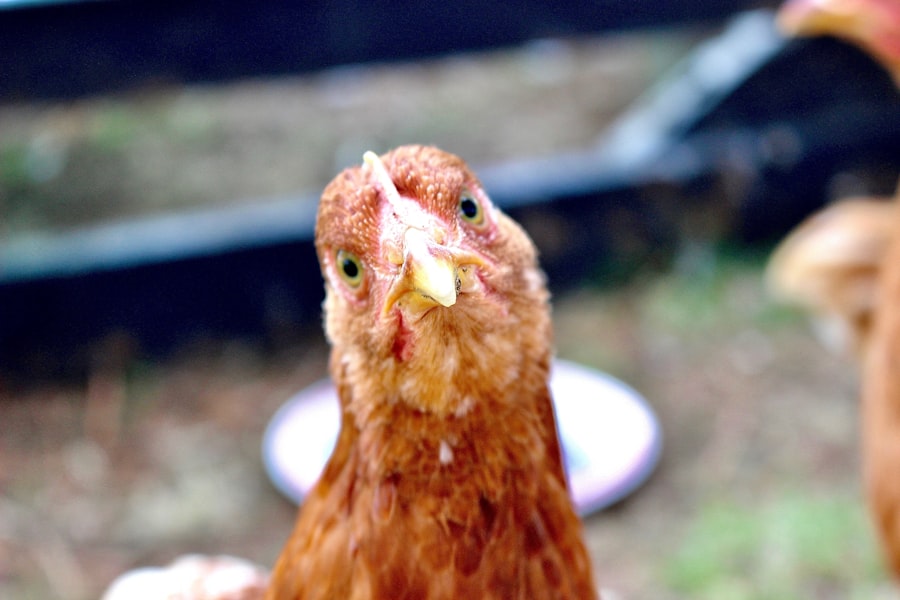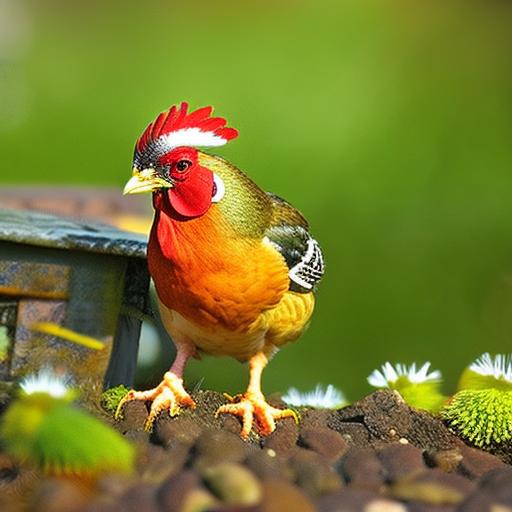Keeping chickens close to your house is a growing trend among homeowners who want to enjoy the benefits of fresh eggs, natural pest control, and fertilizer for their gardens. It can also be a fun and educational experience for kids, teaching them about responsibility and where their food comes from. However, before embarking on this endeavor, there are several factors to consider, such as local laws and regulations, space requirements, noise and odor concerns, time commitment, and safety concerns. By carefully considering these factors and choosing the right chicken coop, you can create a successful and enjoyable experience for both you and your feathered friends.
Key Takeaways
- Keeping chickens close to your house has many benefits, including fresh eggs, natural pest control, and fertilizer for your garden.
- Before keeping chickens, consider factors such as local regulations, space requirements, and potential noise and odor issues.
- Choosing the right chicken coop is important for the health and safety of your chickens, as well as for your own convenience and ease of maintenance.
- When building a chicken coop, consider factors such as ventilation, lighting, and predator-proofing.
- Small backyard? No problem! There are many creative chicken coop design ideas that can fit in even the tiniest of spaces.
Benefits of keeping chickens close to your house
One of the main benefits of keeping chickens close to your house is the availability of fresh eggs every day. There is nothing quite like collecting eggs from your own backyard and knowing exactly where they came from. Not only are they fresher and tastier than store-bought eggs, but they are also more nutritious, as they contain higher levels of vitamins and omega-3 fatty acids.
Another benefit of having chickens in your backyard is natural pest control. Chickens love to eat insects, slugs, and other pests that can damage your garden. By allowing them to roam freely in your yard, they will help keep these pests under control without the need for harmful chemicals.
Chickens also provide a valuable source of fertilizer for your garden. Their droppings are rich in nitrogen, phosphorus, and potassium, which are essential nutrients for plant growth. By composting their waste or using it directly in your garden, you can improve soil fertility and promote healthy plant growth.
Keeping chickens close to your house can also be a fun and educational experience for kids. They will learn about the life cycle of chickens, how to care for them, and the importance of sustainable food production. It can also teach them responsibility as they take on tasks such as feeding, watering, and collecting eggs.
Lastly, keeping chickens can be cost-effective. While there is an initial investment in building a coop and purchasing chickens, the ongoing costs are relatively low. Chickens require minimal feed, especially if they have access to forage in your yard, and their eggs can help offset the cost of their upkeep.
Factors to consider before keeping chickens close to your house
Before bringing chickens into your backyard, there are several factors to consider. First and foremost, you need to check your local laws and regulations regarding keeping chickens. Some areas have restrictions on the number of chickens allowed or require permits. It is important to comply with these regulations to avoid any legal issues.
Space requirements are another important factor to consider. Chickens need enough space to roam and exercise, as well as a secure area for them to sleep and lay eggs. The general rule of thumb is to provide at least 4 square feet of coop space per chicken and 10 square feet of outdoor space per chicken. However, more space is always better, as overcrowding can lead to stress and health problems.
Noise and odor concerns are also important considerations. While chickens are generally not very noisy, they do make some noise, especially when they lay eggs or when a predator is nearby. If you have close neighbors, it is important to consider their tolerance for noise. Additionally, chickens do produce waste, which can have a distinct odor. Regular cleaning and proper waste management can help minimize any unpleasant smells.
Keeping chickens also requires a time commitment. They need daily care, including feeding, watering, cleaning the coop, and collecting eggs. It is important to assess whether you have the time and energy to dedicate to their care before bringing them into your backyard.
Lastly, safety concerns should not be overlooked. Chickens are vulnerable to predators such as raccoons, foxes, and hawks. It is important to provide a secure coop and run to protect them from these threats. Additionally, chickens can carry diseases such as salmonella, so it is important to practice good hygiene and take necessary precautions to prevent the spread of illness.
Choosing the right chicken coop for your backyard
Choosing the right chicken coop is crucial for the health and well-being of your chickens. There are several factors to consider when selecting a coop, including size and design, material options, ventilation and insulation, nesting boxes and roosting bars, and easy access for cleaning and maintenance.
The size and design of the coop will depend on the number of chickens you plan to keep and the available space in your backyard. It is important to provide enough room for your chickens to move around comfortably, as well as space for nesting boxes and roosting bars. The design should also take into consideration predator protection and ease of access for cleaning and maintenance.
When it comes to materials, there are several options available, including wood, plastic, and metal. Wood is a popular choice due to its natural look and insulation properties. However, it requires regular maintenance to prevent rotting. Plastic coops are lightweight and easy to clean but may not be as durable. Metal coops are sturdy and long-lasting but can be more expensive.
Proper ventilation and insulation are essential for the health of your chickens. Good ventilation helps remove moisture, ammonia, and odors from the coop, while insulation helps regulate temperature extremes. It is important to provide adequate airflow without creating drafts or exposing your chickens to extreme temperatures.
Nesting boxes and roosting bars are important features of a chicken coop. Nesting boxes provide a comfortable place for hens to lay their eggs, while roosting bars give them a place to perch at night. It is important to provide enough nesting boxes for your hens, with one box per 3-4 hens being a general guideline. Roosting bars should be placed higher than the nesting boxes and should be wide enough for your chickens to comfortably grip.
Easy access for cleaning and maintenance is another important consideration. The coop should have doors or panels that allow you to easily reach all areas for cleaning, as well as access to the nesting boxes and roosting bars. It is also important to have a removable floor or tray for easy waste removal.
Tips for building a chicken coop close to your house
If you are planning to build your own chicken coop, there are several tips to keep in mind. First and foremost, it is important to plan ahead and gather all the necessary materials before starting construction. This will help ensure a smooth building process and prevent any delays.
When building a chicken coop, it is important to use sturdy and safe construction techniques. The coop should be able to withstand the elements and protect your chickens from predators. It is also important to use non-toxic materials and avoid any sharp edges or protrusions that could harm your chickens.
Consider adding windows and skylights to your chicken coop to provide natural light and ventilation. This will help create a more comfortable environment for your chickens and reduce the need for artificial lighting during the day. Windows can also be opened for additional airflow on hot days.
Proper ventilation and insulation are crucial for the health of your chickens. Make sure to provide enough vents or windows for fresh air circulation, while also ensuring that there are no drafts. Insulation can help regulate temperature extremes, keeping your chickens warm in winter and cool in summer.
In addition to the coop, it is important to provide a run or fenced area for your chickens to roam. This will give them access to fresh air, sunlight, and forage, which are essential for their well-being. The run should be securely fenced to prevent predators from entering and should have a roof or netting to protect against aerial threats.
Chicken coop design ideas for small backyards

If you have a small backyard, there are several chicken coop design ideas that can help maximize space. Vertical coops, for example, utilize vertical space by stacking multiple levels of coops or using tall structures with ramps or ladders. This allows you to house more chickens in a smaller footprint.
Mobile coops, also known as chicken tractors, are another option for small backyards. These coops are designed to be easily moved around your yard, allowing your chickens to graze on fresh grass while also protecting them from predators. They can be built on wheels or skids for easy mobility.
Coops with rooftop gardens are a creative way to maximize space and provide additional benefits. The roof of the coop can be transformed into a garden, where you can grow herbs, vegetables, or flowers. This not only provides extra space for gardening but also helps insulate the coop and provides shade for your chickens.
Coops with attached runs are another option for small backyards. By attaching a run directly to the coop, you can provide your chickens with a safe and secure outdoor space without taking up additional space in your yard. This allows them to have access to fresh air and sunlight while still being protected from predators.
Coops with multiple levels are a great way to maximize space and provide different areas for your chickens. You can have a lower level for nesting boxes and roosting bars, and an upper level for feeding and watering. This design allows your chickens to utilize vertical space while also providing them with separate areas for different activities.
Maintaining a clean and healthy chicken coop
Maintaining a clean and healthy chicken coop is essential for the well-being of your chickens and the quality of their eggs. Regular cleaning and disinfecting are important to prevent the buildup of bacteria and parasites. It is recommended to clean the coop at least once a week, removing any soiled bedding, droppings, and uneaten food.
Proper waste management is also crucial for maintaining a clean and healthy coop. It is important to have a designated area for composting or disposing of chicken waste. This will help prevent odors and reduce the risk of disease transmission. Regularly removing waste from the coop and replacing bedding will also help keep it clean and odor-free.
Pest control is another important aspect of maintaining a clean and healthy coop. Regularly inspect the coop for signs of pests such as mites, lice, or rodents. If you notice any infestations, take appropriate measures to eliminate them, such as using natural pest control methods or consulting with a professional.
Providing fresh bedding and nesting material is essential for the comfort and health of your chickens. Bedding helps absorb moisture and odors, while nesting material provides a comfortable place for hens to lay their eggs. It is recommended to replace bedding and nesting material regularly to maintain cleanliness and prevent the buildup of bacteria.
Monitoring for signs of illness is also important for maintaining a healthy flock. Keep an eye out for any changes in behavior, appetite, or appearance. If you notice any signs of illness, isolate the affected chicken and consult with a veterinarian for proper diagnosis and treatment.
Feeding and watering your backyard chickens
Feeding your backyard chickens a balanced diet is essential for their health and egg production. A good quality chicken feed should provide all the necessary nutrients, including protein, carbohydrates, fats, vitamins, and minerals. It is important to choose a feed that is appropriate for the age and breed of your chickens.
In addition to commercial feed, you can supplement your chickens’ diet with treats and kitchen scraps. However, it is important to avoid feeding them anything that is toxic or harmful to their health. Some safe treats include fruits, vegetables, grains, and mealworms. It is important to offer treats in moderation and ensure that they do not make up more than 10% of their diet.
Fresh water is essential for the health and well-being of your chickens. Make sure to provide clean and fresh water daily, especially during hot weather. It is important to use waterers that are easy to clean and refill to ensure that your chickens always have access to water.
Using feeders and waterers that are easy to clean and refill is important for maintaining cleanliness and preventing the buildup of bacteria. Choose feeders and waterers that are made of durable materials and have removable parts for easy cleaning. It is also important to regularly clean and sanitize them to prevent the spread of disease.
Protecting your chickens from predators
Protecting your chickens from predators is crucial for their safety and well-being. There are several measures you can take to secure the coop and run and prevent predators from entering.
First and foremost, it is important to secure the coop with sturdy materials such as hardware cloth or welded wire mesh. Make sure there are no gaps or holes that predators can squeeze through. Reinforce doors, windows, and vents with locks or latches to prevent them from being opened by predators.
Using fencing and netting around the run can help keep predators out. Choose a fence that is at least 6 feet tall and bury it at least 12 inches deep to prevent digging. Cover the top of the run with netting or wire mesh to protect against aerial threats such as hawks or owls.
Providing hiding places and perches inside the coop can also help protect your chickens from predators. Chickens naturally seek shelter when they sense danger, so providing hiding places such as boxes or tunnels can give them a safe place to retreat. Perches should be placed higher than nesting boxes and should be wide enough for your chickens to comfortably grip.
Using motion-activated lights and alarms can help deter predators from approaching your coop. These devices can startle predators and alert you to their presence, giving you time to intervene and protect your chickens. It is important to be aware of local predators and their habits to choose the most effective deterrents.
Enjoying the benefits of keeping chickens close to your house
Keeping chickens close to your house can be a rewarding and enjoyable experience. The benefits of fresh eggs, natural pest control, and fertilizer for your garden are hard to beat. It can also be a fun and educational experience for kids, teaching them about responsibility and sustainable food production.
However, before embarking on this endeavor, it is important to consider the factors mentioned above, such as local laws and regulations, space requirements, noise and odor concerns, time commitment, and safety concerns. By doing your research and planning ahead, you can create a successful and enjoyable experience for both you and your feathered friends.
Remember to choose the right chicken coop for your backyard, considering factors such as size and design, material options, ventilation and insulation, nesting boxes and roosting bars, and easy access for cleaning and maintenance. Building a chicken coop requires careful planning and construction techniques that ensure the safety and comfort of your chickens.
Maintaining a clean and healthy chicken coop is essential for the well-being of your chickens. Regular cleaning, proper waste management, pest control, providing fresh bedding and nesting material, and monitoring for signs of illness are all important aspects of coop maintenance.
Feeding and watering your backyard chickens a balanced diet is crucial for their health and egg production.
If you’re wondering how to keep your chickens close to your house, you’ll definitely want to check out the article on the Hannah Montana Chicken Coop from Poultry Wizard. This unique and stylish coop design not only provides a safe and comfortable home for your feathered friends but also adds a touch of charm to your backyard. With its easy access and convenient location near your house, you’ll be able to keep a close eye on your chickens while enjoying the benefits of fresh eggs and a delightful coop aesthetic. Discover more about the Hannah Montana Chicken Coop here.
FAQs
Can I keep chickens close to my house?
Yes, you can keep chickens close to your house as long as you follow certain guidelines and regulations.
What are the guidelines for keeping chickens close to my house?
The guidelines for keeping chickens close to your house may vary depending on your location. However, some common guidelines include providing adequate space, shelter, and food for your chickens, keeping them clean and healthy, and ensuring that they do not cause a nuisance to your neighbors.
What are the benefits of keeping chickens close to my house?
Keeping chickens close to your house can provide several benefits, such as a source of fresh eggs, natural pest control, and fertilizer for your garden. Additionally, chickens can be entertaining and enjoyable pets.
What are the potential drawbacks of keeping chickens close to my house?
Some potential drawbacks of keeping chickens close to your house include noise, odor, and the possibility of attracting predators. Additionally, chickens may require more time and effort to care for than other pets.
Do I need a permit to keep chickens close to my house?
The need for a permit to keep chickens close to your house may vary depending on your location. It is important to check with your local government or zoning board to determine if a permit is required.
How many chickens can I keep close to my house?
The number of chickens you can keep close to your house may vary depending on your location and the size of your property. It is important to check with your local government or zoning board to determine any restrictions on the number of chickens you can keep.
Meet Walter, the feathered-friend fanatic of Florida! Nestled in the sunshine state, Walter struts through life with his feathered companions, clucking his way to happiness. With a coop that’s fancier than a five-star hotel, he’s the Don Juan of the chicken world. When he’s not teaching his hens to do the cha-cha, you’ll find him in a heated debate with his prized rooster, Sir Clucks-a-Lot. Walter’s poultry passion is no yolk; he’s the sunny-side-up guy you never knew you needed in your flock of friends!







